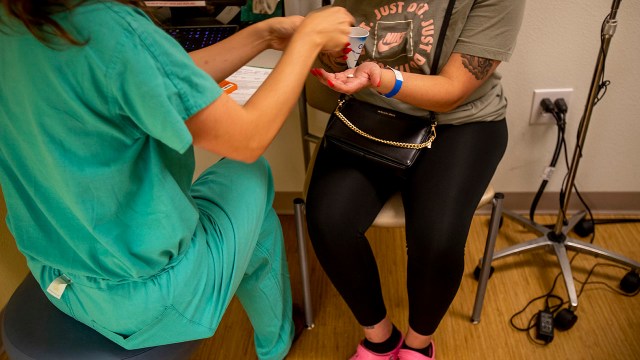
The U.S. Supreme Court’s June 2022 ruling to overturn Roe v. Wade – the decision that had guaranteed a constitutional right to an abortion for nearly 50 years – has shifted the legal battle over abortion to the states, with some prohibiting the procedure and others moving to safeguard it.
As the nation’s post-Roe chapter begins, here are key facts about Americans’ views on abortion, based on two Pew Research Center polls: one conducted from June 25-July 4, just after this year’s high court ruling, and one conducted in March, before an earlier leaked draft of the opinion became public.
This analysis primarily draws from two Pew Research Center surveys, one surveying 10,441 U.S. adults conducted March 7-13, 2022, and another surveying 6,174 U.S. adults conducted June 27-July 4, 2022. Here are the questions used for the March survey, along with responses, and the questions used for the survey from June and July, along with responses.
Everyone who took part in these surveys is a member of the Center’s American Trends Panel (ATP), an online survey panel that is recruited through national, random sampling of residential addresses. This way nearly all U.S. adults have a chance of selection. The survey is weighted to be representative of the U.S. adult population by gender, race, ethnicity, partisan affiliation, education and other categories. Read more about the ATP’s methodology.
A majority of the U.S. public disapproves of the Supreme Court’s decision to overturn Roe. About six-in-ten adults (57%) disapprove of the court’s decision that the U.S. Constitution does not guarantee a right to abortion and that abortion laws can be set by states, including 43% who strongly disapprove, according to the summer survey. About four-in-ten (41%) approve, including 25% who strongly approve.

About eight-in-ten Democrats and Democratic-leaning independents (82%) disapprove of the court’s decision, including nearly two-thirds (66%) who strongly disapprove. Most Republicans and GOP leaners (70%) approve, including 48% who strongly approve.
Most women (62%) disapprove of the decision to end the federal right to an abortion. More than twice as many women strongly disapprove of the court’s decision (47%) as strongly approve of it (21%). Opinion among men is more divided: 52% disapprove (37% strongly), while 47% approve (28% strongly).
About six-in-ten Americans (62%) say abortion should be legal in all or most cases, according to the summer survey – little changed since the March survey conducted just before the ruling. That includes 29% of Americans who say it should be legal in all cases and 33% who say it should be legal in most cases. About a third of U.S. adults (36%) say abortion should be illegal in all (8%) or most (28%) cases.
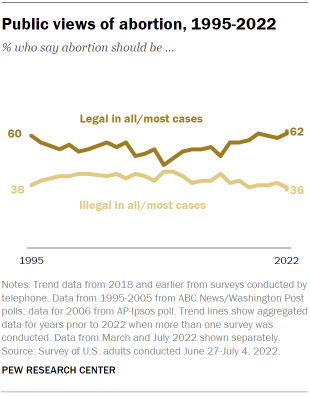
Generally, Americans’ views of whether abortion should be legal remained relatively unchanged in the past few years, though support fluctuated somewhat in previous decades.
Relatively few Americans take an absolutist view on the legality of abortion – either supporting or opposing it at all times, regardless of circumstances. The March survey found that support or opposition to abortion varies substantially depending on such circumstances as when an abortion takes place during a pregnancy, whether the pregnancy is life-threatening or whether a baby would have severe health problems.
While Republicans’ and Democrats’ views on the legality of abortion have long differed, the 46 percentage point partisan gap today is considerably larger than it was in the recent past, according to the survey conducted after the court’s ruling. The wider gap has been largely driven by Democrats: Today, 84% of Democrats say abortion should be legal in all or most cases, up from 72% in 2016 and 63% in 2007. Republicans’ views have shown far less change over time: Currently, 38% of Republicans say abortion should be legal in all or most cases, nearly identical to the 39% who said this in 2007.
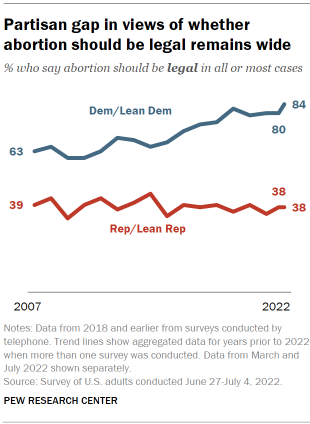
However, the partisan divisions over whether abortion should generally be legal tell only part of the story. According to the March survey, sizable shares of Democrats favor restrictions on abortion under certain circumstances, while majorities of Republicans favor abortion being legal in some situations, such as in cases of rape or when the pregnancy is life-threatening.
There are wide religious divides in views of whether abortion should be legal, the summer survey found. An overwhelming share of religiously unaffiliated adults (83%) say abortion should be legal in all or most cases, as do six-in-ten Catholics. Protestants are divided in their views: 48% say it should be legal in all or most cases, while 50% say it should be illegal in all or most cases. Majorities of Black Protestants (71%) and White non-evangelical Protestants (61%) take the position that abortion should be legal in all or most cases, while about three-quarters of White evangelicals (73%) say it should be illegal in all (20%) or most cases (53%).
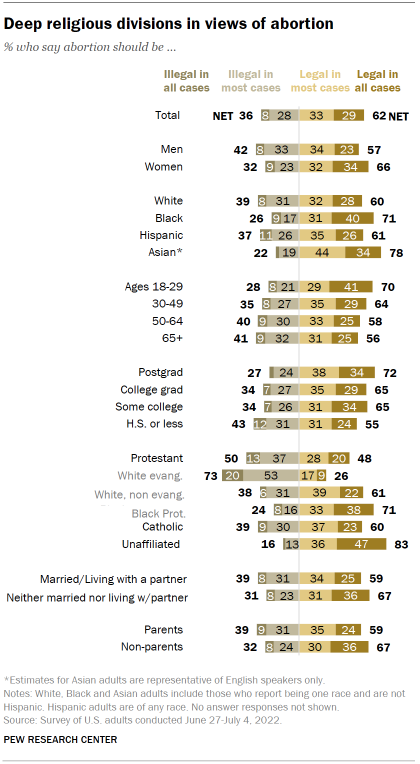
In the March survey, 72% of White evangelicals said that the statement “human life begins at conception, so a fetus is a person with rights” reflected their views extremely or very well. That’s much greater than the share of White non-evangelical Protestants (32%), Black Protestants (38%) and Catholics (44%) who said the same. Overall, 38% of Americans said that statement matched their views extremely or very well.
Catholics, meanwhile, are divided along religious and political lines in their attitudes about abortion, according to the same survey. Catholics who attend Mass regularly are among the country’s strongest opponents of abortion being legal, and they are also more likely than those who attend less frequently to believe that life begins at conception and that a fetus has rights. Catholic Republicans, meanwhile, are far more conservative on a range of abortion questions than are Catholic Democrats.
Women (66%) are more likely than men (57%) to say abortion should be legal in most or all cases, according to the survey conducted after the court’s ruling.
More than half of U.S. adults – including 60% of women and 51% of men – said in March that women should have a greater say than men in setting abortion policy. Just 3% of U.S. adults said men should have more influence over abortion policy than women, with the remainder (39%) saying women and men should have equal say.
The March survey also found that by some measures, women report being closer to the abortion issue than men. For example, women were more likely than men to say they had given “a lot” of thought to issues around abortion prior to taking the survey (40% vs. 30%). They were also considerably more likely than men to say they personally knew someone (such as a close friend, family member or themselves) who had had an abortion (66% vs. 51%) – a gender gap that was evident across age groups, political parties and religious groups.
Relatively few Americans view the morality of abortion in stark terms, the March survey found. Overall, just 7% of all U.S. adults say having an abortion is morally acceptable in all cases, and 13% say it is morally wrong in all cases. A third say that having an abortion is morally wrong in most cases, while about a quarter (24%) say it is morally acceptable in most cases. An additional 21% do not consider having an abortion a moral issue.
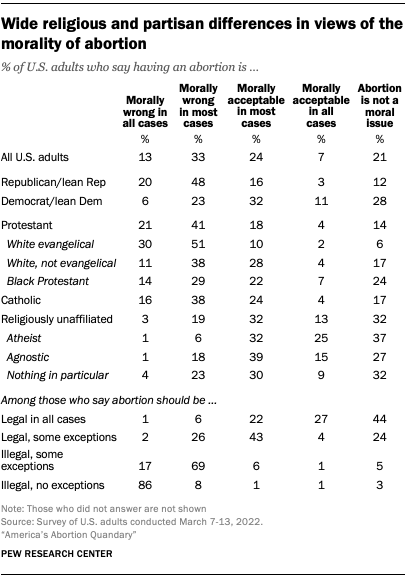
Among Republicans, most (68%) say that having an abortion is morally wrong either in most (48%) or all cases (20%). Only about three-in-ten Democrats (29%) hold a similar view. Instead, about four-in-ten Democrats say having an abortion is morally acceptable in most (32%) or all (11%) cases, while an additional 28% say it is not a moral issue.
White evangelical Protestants overwhelmingly say having an abortion is morally wrong in most (51%) or all cases (30%). A slim majority of Catholics (53%) also view having an abortion as morally wrong, but many also say it is morally acceptable in most (24%) or all cases (4%), or that it is not a moral issue (17%). Among religiously unaffiliated Americans, about three-quarters see having an abortion as morally acceptable (45%) or not a moral issue (32%).



